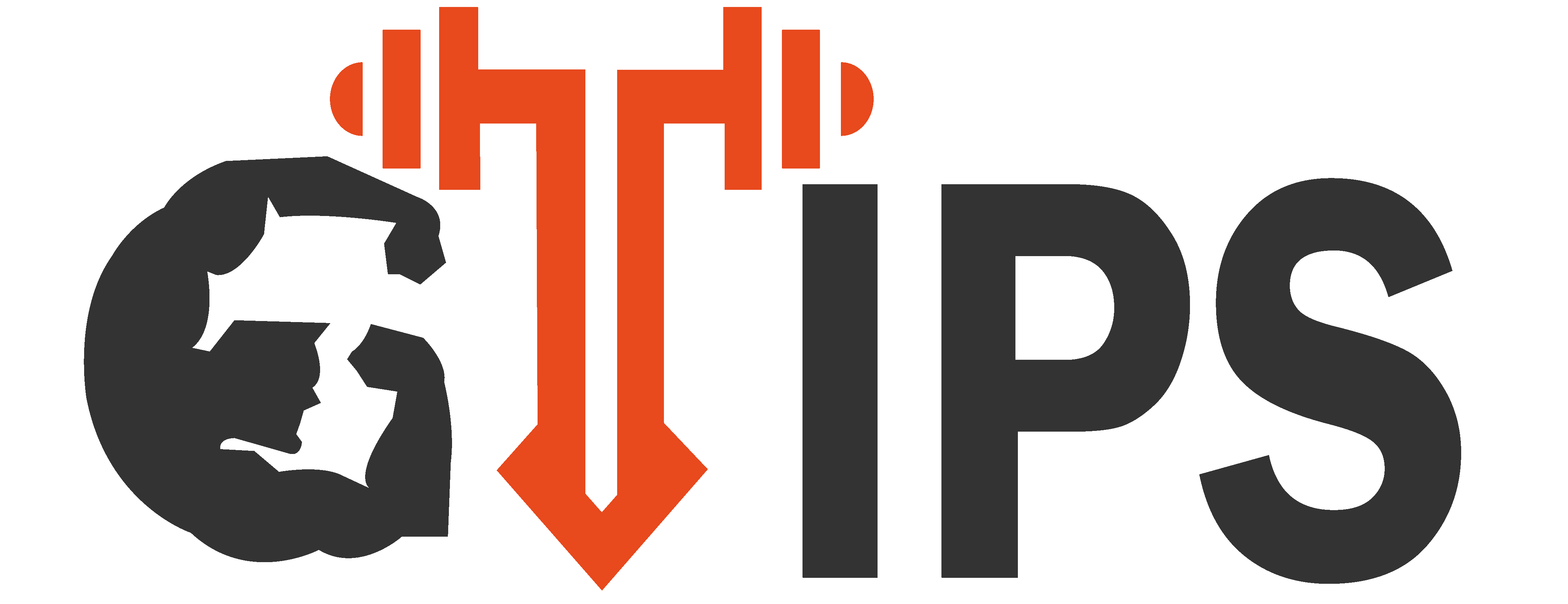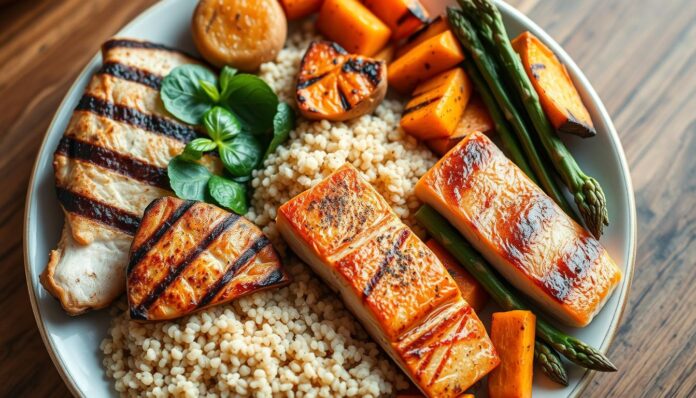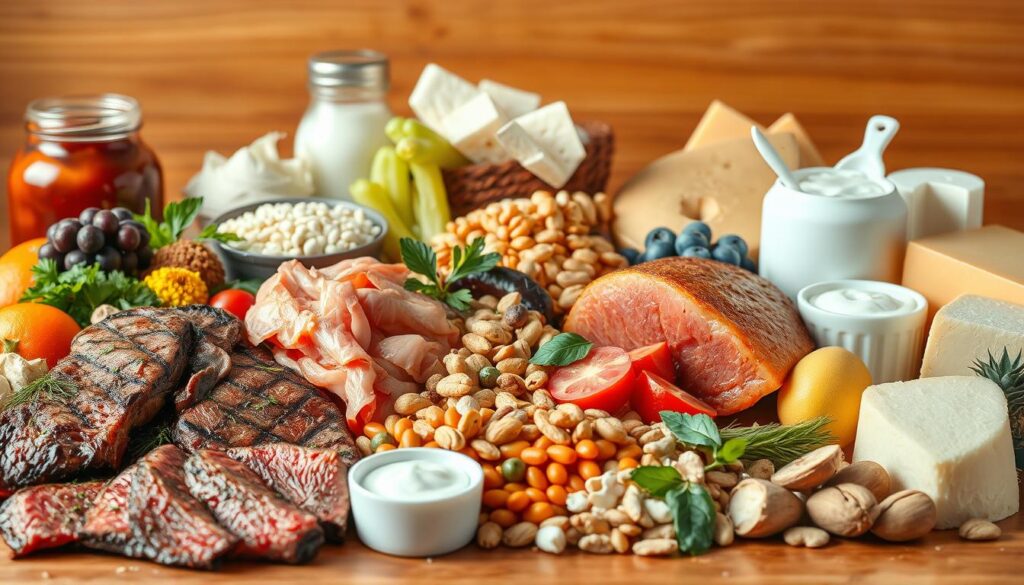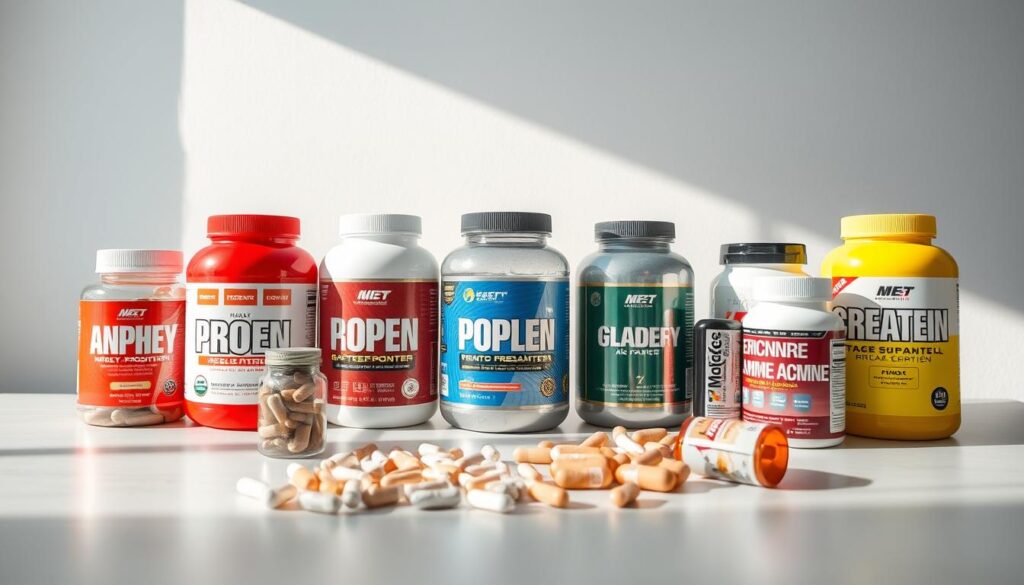Imagine a gym full of people working hard to reach their fitness goals. One woman stands out, lifting weights with all her might. She knows that just working out isn’t enough. She needs the right food to fuel her progress.
She focuses on a diet rich in nutrients to support her strength goals. It’s not just about lifting; it’s about eating right too. The right foods are key to her fitness success.
Starting your own strength journey? Knowing about nutrition is key. A good diet helps muscles grow, recover faster, and boosts fitness. Learn how different nutrients help your body and how to succeed in your workouts. For more on female strength training and nutrition, check out this resource.
Key Takeaways
- Nutrition is vital for optimizing muscle growth and strength.
- A balanced muscle-building diet includes essential macronutrients and micronutrients.
- Incorporating a variety of protein sources can diversify your nutrient intake.
- Timing your nutrient intake can enhance workout performance and recovery.
- Hydration plays a critical role in muscle development and performance.
Understanding the Role of Nutrition in Muscle Building
Nutrition is key to building muscle. It’s not just about calories, but also the right mix of macronutrients and micronutrients. These nutrients help your muscles grow and recover.
Knowing about macronutrients like proteins, carbs, and fats is important. It helps you eat right for muscle growth and keeping muscles strong.
Importance of Macronutrients
Macronutrients are vital for those who work out a lot. They should make up 30-35% of your calories. This includes proteins, carbs, and fats.
When bulking, you need to eat about 15% more calories. For example, if you eat 3,000 calories, you should aim for 3,450. To cut down, eat 15% less, aiming for 2,550 calories.
Protein is key for muscle growth. Aim for 1.4 to 2 grams of protein per kilogram of body weight daily. This means 259-302 grams of protein for bodybuilders during bulking, and 191-223 grams when cutting.
Carbs help refill glycogen stores. You need 474-518 grams daily when bulking, and 351-383 grams when cutting. Don’t forget healthy fats, which should be 58-77 grams daily when bulking and 43-57 grams when cutting.
Role of Micronutrients
Micronutrients like vitamins and minerals are also important. They help your body function well and recover faster. Eating too few calories or not enough nutrients can harm your mood and sleep.
Eating a variety of fruits, veggies, and whole grains is essential. It helps you get all the nutrients you need for muscle growth and better performance.
Understanding nutrition fully is the first step to building muscle and improving performance. It’s all about the right mix of nutrients.
Essential Macronutrients for Muscle Growth
To build muscle, knowing the key nutrients is vital. Your diet needs enough protein, carbs, and healthy fats. These help grow muscles effectively.
Protein: The Building Block of Muscle
Protein is the base for muscle growth. It gives your muscles the amino acids they need to repair and grow. Aim for 30-35% of your calories to be from protein.
For 2,000 calories, that’s 600-700 calories or 150-175 grams of protein. Eat high-quality proteins like chicken, fish, dairy, and legumes.
Carbohydrates: Energy for Performance
Carbs are key for energy during workouts and recovery. They should make up 45-50% of your calories. For 2,000 calories, aim for 900-1,000 calories from carbs.
Choose complex carbs like whole grains, fruits, and veggies. They keep your energy up during training.
Fats: Supporting Hormonal Balance
Healthy fats are important for hormone production, which helps with muscle growth and recovery. Aim for 20-25% of your calories from fats.
Opt for unsaturated fats like avocados, nuts, and olive oil. They support body functions and provide energy. This balance is key for health and muscle growth.
Protein Sources You Should Include in Your Diet
Building muscle effectively means knowing the right protein sources. Protein is key for muscle repair and growth. It’s important to eat a variety of protein-rich foods. There are two main types: animal-based and plant-based proteins. Each has benefits for muscle gain and health.
Animal-Based Proteins
Animal-based proteins are complete proteins. They have all the amino acids needed for muscle growth. Here are some top foods for muscle gain:
- Chicken breast: A medium chicken breast (120 g) provides approximately 35.5 g of protein.
- Fish: A 227 g salmon steak contains around 58.5 g of protein, while tuna offers about 7 g of protein per ounce.
- Eggs: One boiled or poached egg has 6.28 g of protein, which can enhance your protein intake easily.
- Dairy products: Five ounces of Greek yogurt contains 12–18 g of protein, while skimmed milk provides 8 g per 8 oz.
- Lean beef: This source delivers just over 23 g of protein per 4 oz, making it a strong option for muscle building.
Plant-Based Proteins
Plant-based proteins are great alternatives or additions to animal-based options. They’re perfect for vegetarians or vegans. They’re also rich in other nutrients. Here are some good choices:
- Legumes: Lentils contain about 9 g of protein per half-cup, while canned chickpeas provide 14.6 g per cup.
- Nuts and seeds: A cup of dry roasted almonds holds nearly 29 g of protein. Sunflower seeds provide just under 14 g per half-cup.
- Quinoa: This whole grain offers between 9.1–15.7 g of protein per 100 g, making it a versatile base for meals.
- Tofu: Commonly used in vegetarian dishes, tofu contains around 12.68 g of protein per 100 g.
- Edamame: Fresh or frozen, these provide 6 g of protein per half-cup, making them a quick snack option.
Mixing different protein sources in your diet boosts your protein intake. Aim for 1.4–2.0 grams of protein per kilogram of body weight daily. This variety ensures you get all the nutrients needed for muscle growth and recovery.
Timing Your Nutrient Intake for Optimal Results
Nutrient timing is key to building muscle. Eating at the right times can boost your workout and recovery. Knowing about pre-workout meals and post-workout recovery meals helps you get the most from muscle-building nutrition.
Pre-Workout Nutrition
It’s important to eat well before working out. A balanced meal 60 to 150 minutes before can improve your performance. The right mix of carbs and proteins helps refill energy stores.
Try to eat 1.1 to 2.2 grams of carbs per kilogram of body weight an hour before. Also, drink 12 to 16 ounces of water to get ready for your workout.
Post-Workout Recovery
After working out, your body is ready to absorb nutrients best for about 15 to 60 minutes. Even though glycogen replenishment might not be as important, eating a mix of proteins and carbs is key. Aim for 32 grams of protein and 34 grams of carbs to build muscle strength and size.
This balanced diet supports recovery and prepares you for the next workout. For more on nutrition for workouts, check out this resource.
The Importance of Hydration in Muscle Development
Hydration is key for muscle growth and better performance. The hydration importance is huge, as it helps with strength and endurance. Not drinking enough water can cause fatigue, muscle cramps, and less strength.
To perform well, staying hydrated is essential, more so with resistance training.
Effects of Dehydration on Performance
Dehydration hurts your physical performance a lot. Even a 2% drop in body weight from losing fluids can weaken strength and endurance. Without enough water, muscles get less oxygen, leading to more fatigue and slower recovery.
For those aiming to grow muscles, knowing these effects of dehydration is vital. It’s important to drink water before, during, and after workouts to help muscles perform better and stay healthy.
Recommended Daily Water Intake
How much water you need for muscle growth depends on your body weight, activity level, and the weather. Generally, men should drink at least 3 liters (about 13 cups) a day, and women should aim for 2.2 liters (about 9 cups). You might need more water during hard workouts or when it’s hot outside.
Tracking your water intake can boost your performance and recovery. This lets you get the most out of your workouts and nutrition. For a complete muscle growth plan, don’t forget to include hydration strategies with your nutrition plan. Learn more about how these elements work together at this resource.
| Hydration Guidelines | General Recommendations |
|---|---|
| Men | 3 liters (13 cups) daily |
| Women | 2.2 liters (9 cups) daily |
| During Exercise | Additional 1-2 cups per hour |
| Hot Weather | Increase intake based on activity |
Supplements to Enhance Muscle Growth
Supplements can really help you build muscle faster and perform better. Creatine and whey protein are two top choices. They offer different benefits and can match your fitness plan. Knowing how they work helps you pick the best supplements for muscle growth.
Creatine: How It Works
Creatine is a well-studied supplement for building muscle. It boosts ATP production, giving you energy for intense workouts. Many people see big creatine benefits, like stronger muscles and more mass.
Start with a 20-gram loading dose for 5-7 days. Then, take 3-5 grams daily for up to 12 weeks. Remember, creatine might cause weight gain and stomach problems.
Whey Protein: A Convenient Option
Whey protein is a favorite for building muscle. It’s a fast and easy protein source after working out. Most whey protein has 20-30 grams of protein per serving.
Studies show it’s safe to take up to 30 grams for six months. Adding whey protein to your diet, after exercising, boosts muscle recovery and growth.
The Impact of Nutrition on Recovery
Nutrition is key for muscle recovery after hard workouts. Eating the right mix of nutrients helps fix muscle damage. Protein, carbs, and healthy fats are important for better recovery and performance.
Nutrients That Aid Muscle Repair
Knowing what nutrients help repair muscles is important. Protein is a main player in fixing muscle damage. Studies show that enough protein, like from whey protein isolate, can lessen muscle damage and aid recovery.
- Protein: Whey protein isolate is great for athletes wanting to reduce muscle soreness.
- Carbohydrates: They give energy during long workouts and help with recovery after.
- Fats: Healthy fats, like those in fish and olive oil, help with inflammation and recovery.
The Role of Sleep in Recovery
Sleep is vital for muscle recovery. It helps balance hormones and build muscle. Not enough sleep can hurt your performance in future workouts.
Research shows sleep is linked to better muscle repair. Athletes who sleep well recover faster and feel less sore. Good sleep habits improve recovery and performance.
The Connection Between Nutrition and Performance
Your diet greatly affects how well you perform in strength training. Knowing how nutrition impacts muscle growth and endurance can boost your workouts. By focusing on key nutrients, you can tailor your diet to meet your fitness goals.
How Diet Influences Strength Training
A good diet can make your strength training more effective. Protein is key for muscle growth. If you weigh 75kg, you need about 56g of protein each day. This is because protein makes up 80% of muscle.
After a tough workout, your muscles recover for up to 24 hours. It’s important to eat carbs and protein after exercising. Foods like chicken breast and cottage cheese are great for muscle recovery.
Nutritional Strategies for Endurance
For endurance athletes, the right nutrition is essential. Carbs help refill glycogen stores, important for long workouts. Eating carbs and protein after exercise boosts glycogen synthesis.
Try to avoid fatty meals before working out. They can slow digestion. Instead, choose clean fats for better nutrient absorption. A balanced diet keeps your body performing at its best. For more tips on building strength, check out this resource.
Planning Balanced Meals for Muscle Growth
To build muscle, it’s key to know how to mix macronutrients. Balanced meals are essential for muscle growth. They give you the right nutrients. By focusing on portion sizes, you can meet your calorie and nutrient needs without overdoing it.
Sample Meal Ideas
Start by adding different meals to your diet that help build muscle:
- Breakfast: Scrambled eggs with spinach and whole-grain toast, plus a fruit serving.
- Lunch: Grilled chicken salad with quinoa and veggies, topped with olive oil.
- Dinner: Baked salmon with brown rice and steamed broccoli, seasoned well.
- Snacks: Greek yogurt with berries or a banana and almond milk smoothie.
Understanding Portion Sizes
Getting the right portion sizes is critical for muscle growth. Here are some guidelines for effective meal plans:
| Food Group | Portion Size | Notes |
|---|---|---|
| Protein (e.g., chicken, fish) | 4-6 ounces | Aim for 0.4 to 0.55 grams per kg of body weight per meal. |
| Carbohydrates (e.g., rice, quinoa) | 1-2 cups cooked | Consider 3.5 to 5 grams per kg of body weight. |
| Vegetables (e.g., leafy greens) | 2-3 cups | Choose nitrate-rich options for enhanced strength. |
| Fats (e.g., nuts, oils) | 1-2 tablespoons | Maintain moderate intake aligned with body weight. |
With these meal ideas and portion sizes, you can make a balanced diet. This diet supports your strength goals. Adding these meals to your daily routine helps you reach your fitness goals.
Common Nutrition Myths in Muscle Building
Understanding nutrition can be tough, with many myths about building muscle. You might have heard false ideas that could steer you wrong. By focusing on real evidence and expert advice, we can clear up these myths and find better ways to build muscle.
Debunking the High-Protein Myth
Many believe you need lots of protein to grow muscle. But research shows you can build muscle with less protein than you think. For example, studies say you only need 0.36 grams of protein per pound of body weight to keep muscle.
This means someone who weighs 180 pounds only needs 54 grams of protein a day. The idea that more than 20-30 grams per meal is wasted is high-protein debunked. People who lift weights can get the same muscle benefits whether they eat protein before or after working out.
Misconceptions About Carbs
Carbohydrates are often seen as bad for muscle growth. But they’re actually key for athletes as an energy source. Experts say adults should get 45-65% of their energy from carbs.
Studies show athletes on low-carb diets can keep their muscle mass just like those on high-carb diets. This carbohydrate misconception shows carbs are important for intense workouts. It’s more important to keep your calorie and protein intake steady than to cut out carbs.
Creating a Sustainable Nutrition Plan
Starting your muscle-building journey means having a solid nutrition plan. A balanced diet is key for both muscle growth and health. It helps you make gradual changes that support your strength training without feeling too restricted.
Setting Realistic Goals
Setting goals that you can reach is vital. Instead of big changes, make small steps. Studies show that tracking what you eat helps you meet your fitness goals.
Using a flexible way to track macros lets you enjoy your favorite foods while reaching your goals. Regularly check your diet to make sure it fits your changing needs.
Also, adding the six pillars of lifestyle medicine to your routine is important. This includes good nutrition, exercise, and managing stress. It helps you stay healthy and improves your life quality. This approach supports muscle growth and helps you deal with health issues better.
FAQ
What is the importance of nutrition in muscle building?
Nutrition is key for building muscle. It boosts strength, aids in recovery, and improves fitness. A diet rich in essential nutrients is vital for your muscle-building goals.
How much protein do I need for muscle growth?
Aim for 1.4 to 2 grams of protein per kilogram of body weight daily. This supports muscle growth and recovery.
What role do carbohydrates play in muscle development?
Carbs are vital for replenishing glycogen stores. They fuel workouts and aid recovery. Include 45-55% of your daily calories from carbs for best performance.
Can I get enough protein from plant-based sources?
Yes, beans, lentils, and quinoa are good plant-based protein sources. But, animal proteins offer complete amino acids. So, mix both in your diet.
When should I eat before and after my workouts?
Eat foods high in energy and glycogen before workouts. After, focus on protein and carbs to repair and grow muscles.
How does hydration affect muscle performance?
Hydration is key for muscle growth and performance. Dehydration can reduce strength and endurance. Drink 3-4 liters daily, adjusting for activity and climate.
What supplements can support my muscle growth efforts?
Creatine and whey protein can help. Creatine boosts ATP for strength and mass. Whey protein provides quick protein for recovery.
How does nutrition support recovery after exercise?
Nutrition, including protein, carbs, and fats, is vital for recovery. It also helps with muscle repair and growth, improving performance.
How should I plan my meals for optimal muscle growth?
Plan meals with a mix of macronutrients. Try grilled chicken with quinoa and veggies or a smoothie with spinach and protein powder. Watch portion sizes to meet calorie needs.
What are some common misconceptions about muscle-building nutrition?
Some think high protein is all you need or that carbs are bad. But, a balanced diet with all nutrients is key for muscle growth and health.
How can I create a sustainable nutrition plan for muscle building?
Create a sustainable plan by setting realistic goals and making lasting dietary changes. Regularly check and adjust your diet to optimize progress.






